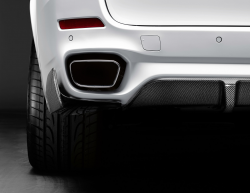
— A BMW diesel emissions lawsuit has been dismissed entirely after the judge ruled he wasn't impressed by arguments made by BMW owners.
The proposed BMW emissions class action lawsuit alleges the diesel engines in 2009-2013 BMW X5 xDrive35d and the 2009-2011 BMW 335d vehicles are equipped with emissions defeat devices.
This allegedly causes the vehicles to emit nitrogen oxides at levels above federal standards, something made possible with BMW allegedly conspiring with parts manufacturer Bosch. The lawsuit says Bosch colluded with BMW to market the diesel vehicles as "clean" even though both companies knew the advertising was wrong.
Attorneys for the plaintiffs filed the original lawsuit in March 2018 titled, Rickman v. BMW of North America, et al. Plaintiffs then filed an amended lawsuit captioned Maccanelli, et al., v. BMW of North America, et al.
On May 8, 2018, the same attorneys filed another BMW lawsuit using different plaintiffs, this one titled, Evans, et al. v. BMW of North America LLC, et al, which added 21 new plaintiffs but was otherwise nearly identical to the Maccanelli lawsuit. On August 3, 2018, the plaintiffs consolidated two class actions and voluntarily dismissed the Evans lawsuit.
According to the plaintiffs, BMW hid the true emissions levels by using the emissions defeat devices similar to what Volkswagen used to conceal the true emissions levels in millions of its diesel vehicles.
Bosch developed and manufactured the electronic diesel controls (EDCs) that allowed BMW to allegedly use emissions defeat devices.
The Bosch EDC17 is allegedly a “perfect enabler for the use of a defeat device because it empowers software within the car to detect whether the car is experiencing a test environment versus normal driving conditions and alters emissions output accordingly."
The plaintiffs argue since this is the same device Volkswagen used to break emissions laws, BMW must be doing the same thing in their X5 xDrive35d and BMW 335d diesel models.
The plaintiffs also attempt to argue their allegations against BMW and Bosch are credible because of a “a worldwide diesel emissions cheating scandal.”
In its motion to dismiss the suit, BMW referenced a recent and similar emissions lawsuit (Bledsoe v. FCA US LLC) against Chrysler (FCA) and engine supplier Cummins that alleged the two companies colluded to install illegal emissions defeat devices in two truck models.
The Bledsoe case also referenced a “worldwide emissions scandal” to allegedly support the claim Ram trucks were illegal.
But the original Bledsoe lawsuit, which was dismissed, also used emissions test results from just one truck to supposedly show all the trucks in the country are illegal.
Judge Kevin McNulty ruled none of the 42 named plaintiffs who allegedly own a BMW X5 xDrive35d or 335d make allegations their specific vehicles were tested and found to contain defeat devices. The judge saw this as a major problem because the lawsuit alleges all X5 and 335d vehicles are illegal, but only one vehicle was tested for the lawsuit.
On top of that, the BMW X5 that was tested didn't belong to any of the named plaintiffs, and the judge pointed out how the tested vehicle was six years old and had 60,000 miles on the odometer.
The lawsuit alleges the testing of the one vehicle showed a discrepancy between on-road emissions levels and laboratory levels.
But according to the judge:
"There seems to have been no further physical or electronic analysis attributing the discrepancy, which might have a number of explanations, to a defeat device."
The judge also found the weak link in the lawsuit was the inference that anyone, including the 42 named plaintiffs, unknowingly purchased a BMW vehicle equipped with a defeat device.
According to Judge McNulty, he examined the allegations in the context of other diesel emissions lawsuits in which motions to dismiss were denied.
The judge said those lawsuits "tended to offer more corroboration, generally consisting of official findings or testing from independent sources which tended to suggest a uniform practice of installing a defeat device in a particular model."
But the 42 plaintiffs who filed the BMW lawsuit didn't adequately allege they or any other affected vehicle owners "suffered an injury in fact."
Although the judge ruled the lawsuit is over, he did give the plaintiffs 60 days to file an amended complaint if they wish.
The BMW diesel emissions lawsuit was filed in the U.S. District Court for the District of New Jersey - Rickman, et al., v. BMW of North America LLC, et al.
The plaintiffs are represented by Carella, Byrne, Cecchi, Olstein, Brody, Agnello, P.C., Hagens Berman, Seeger Weiss, and The Miller Law Firm PC.




